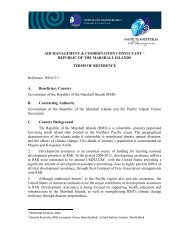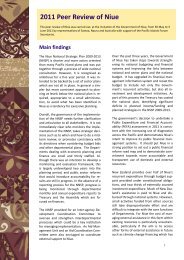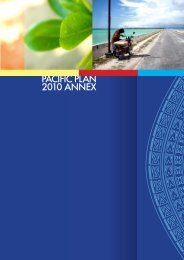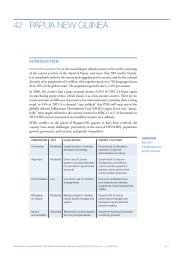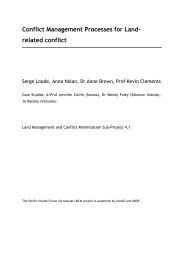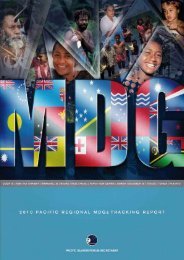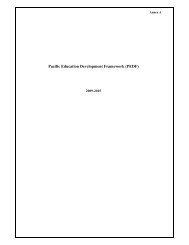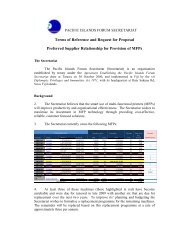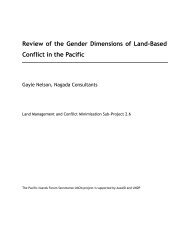Kolonia and Weno, Federated States of Micronesia CHAPTER 3 ...
Kolonia and Weno, Federated States of Micronesia CHAPTER 3 ...
Kolonia and Weno, Federated States of Micronesia CHAPTER 3 ...
Create successful ePaper yourself
Turn your PDF publications into a flip-book with our unique Google optimized e-Paper software.
42<br />
U R B A N Y O U T H I N T H E P A C I F I C<br />
no activities were reported at all. There were also no activities reported for strategies under<br />
“Youth <strong>and</strong> Health” for substance abuse counselling <strong>and</strong> child abuse. 62<br />
Youth Institutions <strong>and</strong> Key Organizations<br />
At the national level, the Department <strong>of</strong> Health <strong>and</strong> Social Affairs (HSA) is responsible<br />
for youth issues <strong>and</strong> development. Within HSA the National Youth<br />
Office aims to coordinate <strong>and</strong> implement youth programmes <strong>and</strong><br />
organizes National Youth Summits. However, the position <strong>of</strong><br />
National Youth Officer has been vacant, which has limited<br />
progress in implementing these activities. As an immediate<br />
priority, it is imperative that the National Youth Office is<br />
provided with qualified personnel <strong>and</strong> sufficient funding<br />
to effectively discharge its m<strong>and</strong>ate.<br />
The National Youth Office has the responsibility for<br />
coordinating support to young people at both national <strong>and</strong><br />
state levels. In total 37 government, non-government agencies<br />
<strong>and</strong> faith based organizations are listed as partners <strong>of</strong> HSA. It is<br />
positive that efforts have been made to develop partnerships in support<br />
<strong>of</strong> youth <strong>and</strong> this needs to continue for maximum impact.<br />
In particular, the National Youth Office works closely with the FSM National Youth Council,<br />
<strong>and</strong> State Youth Councils (FSMYC), however, financial assistance from Government to the<br />
Councils is not available. The FSMYC through its by-laws is an incorporated body. It is made<br />
up <strong>of</strong> executive members who are elected from the four FSM states youth organizations.<br />
FSMYC aims to empower young people by providing youth specific activities <strong>and</strong> conducting<br />
educational awareness raising programmes on issues that are affecting young <strong>Micronesia</strong>ns.<br />
They are currently receiving capacity building assistance from the Pacific Youth Council to<br />
strengthen their institutional capabilities <strong>and</strong> better communicate with young people <strong>and</strong><br />
other youth groups.<br />
Justice Institutions <strong>and</strong> Policies<br />
This study focuses specifically on the impact <strong>of</strong> crime <strong>and</strong> violence on young people. In that<br />
context, justice sector agencies, including the Department <strong>of</strong> Justice, Public Prosecutor <strong>and</strong><br />
Defender <strong>and</strong> Correctional Services have a special importance. In 2006, the Department<br />
<strong>of</strong> Justice developed a Justice Sector Children’s H<strong>and</strong>book which was intended to provide<br />
guidance to state justice agencies on a range <strong>of</strong> issues relating to children. The H<strong>and</strong>book<br />
provided specific guidance on the development <strong>of</strong> juvenile justice acts by states. It is<br />
understood that draft bills have been prepared by Pohnpei <strong>and</strong> Chuuk which are intended to<br />
ensure more appropriate juvenile justice, but these bills have not yet been passed by state<br />
legislatures.<br />
Currently, cases involving juveniles are covered under the ordinary state criminal codes. For<br />
misdemeanours such as minor theft, drunk <strong>and</strong> disorderly conduct, <strong>and</strong> v<strong>and</strong>alism, juveniles<br />
are <strong>of</strong>ten given a warning by police. For more serious crimes, they are brought to the police<br />
station where they are held until a parent or guardian arrives with the expectation that<br />
parents/guardians will discipline their children. Trials for juveniles are mostly closed, with<br />
parents present but no information made public. A juvenile may be sentenced to probation<br />
62 HSA 2006.



